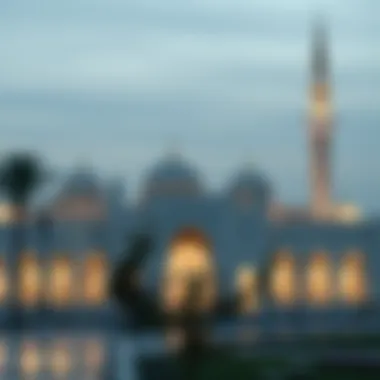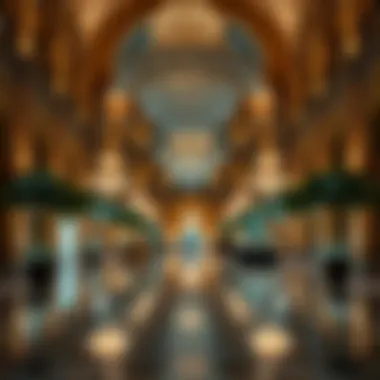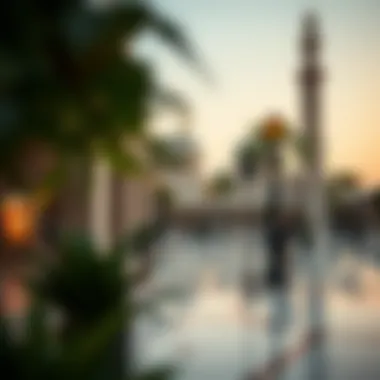Explore Upcoming Holidays in the UAE: Insights and Impact


Intro
As the UAE continues to be a melting pot of cultures, its holidays reflect a rich tapestry of traditions and modern influences. This article aims to shed light on the upcoming holidays within the United Arab Emirates, detailing their historical significance and cultural dimensions. Moreover, it will examine how these holidays extend their influence beyond mere celebrations into crucial sectors like real estate, providing a holistic view not just for residents, but also for international investors, buyers, and developers.
Understanding the holidays can shed light on the rhythm of life in the UAE. Each holiday comes with its unique customs and traditions, and by aligning with these observances, stakeholders can better navigate the landscape, optimizing their interactions in this vibrant region.
In the following sections, we will explore key aspects of the property market, encapsulating current trends, insightful neighborhood details, and guidelines for buying or selling property during these festive periods. Whether you are looking to invest, sell, or simply engage more deeply with the culture, this overview is tailored to provide the in-depth knowledge you need to thrive in the UAE’s dynamic real estate market.
Stay tuned as we embark on this comprehensive delve into the upcoming holidays in the UAE.
Understanding the Cultural Significance of Holidays in the UAE
Holidays in the UAE are more than just breaks from routine. They embody the rich tapestry of traditions, values, and social fabrics that define the nation. From the bustling markets during Eid celebrations to the quiet reflections on Islamic New Year, each holiday provides a unique window into the heart of Emirati culture. As people from various backgrounds come together to celebrate, the significance of these holidays extends beyond personal enjoyment; they reinforce community bonds and national identity.
While modern developments may shape how holidays are observed, the underlying historical context often provides the soul of these celebrations. Festivals can stir sentiments of nostalgia, reminding individuals of their familial ties and roots within the broader cultural landscape. For investors and developers, understanding this cultural significance is essential. It can dictate market trends, influence consumer behavior, and impact how properties are promoted or developed.
Historical Context
The UAE's holidays stem from a rich historical background that intertwines with Islamic traditions and Bedouin heritage. Key holidays such as Eid al-Fitr and Eid al-Adha originate from religious practices that date back centuries. These occasions signify deeply rooted values of charity, community, and gratitude, reflecting the Islamic faith’s emphasis on collective well-being.
Historically, the date of Eid al-Fitr, which marks the end of Ramadan, is determined by the lunar calendar. This reliance on astronomical observations aligns with a tradition of seeking knowledge, often celebrated within the Emirati culture. As cities developed, new secular holidays emerged, such as the National Day, which honors the UAE's unification in 1971. This day encapsulates patriotism while also bridging modern aspirations with traditional roots.
People commemorate these special days with vibrant festivities, feasts, and family gatherings. Historical contexts also shape public sentiment during these holidays; residents take pride in partaking in age-old customs while continuing to embrace contemporary practices that reflect their evolving identities.
Modern Interpretations
In recent years, how holidays are celebrated in the UAE has transformed significantly. With a diverse population, the interpretation of these holidays now encompasses a medley of customs from various cultures. What was once a strictly local celebration has become a melting pot, where national and international traditions coexist.
For example, the National Day is not just marked by fireworks and parades but also includes international music acts, food festivals, and art exhibits that draw from local and global influences. Similarly, Eid holidays now see a mixture of traditional elements such as prayer and feasting alongside modern entertainment, like concerts and markets designed for a fusion of experiences.
"Understanding the cultural significance of these holidays is vital for anyone looking to invest in the UAE market. It’s not just about dates on a calendar; it’s about the ethos of a community."
This shift reflects the UAE's commitment to fostering inclusivity while reinforcing its cultural identity. Such modern interpretations can also present opportunities for businesses. Local enterprises, especially in tourism and real estate, can capitalize on heightened interest by aligning their services to cater to both residents’ and international visitors’ needs during holiday seasons.
As Emiratis continue to navigate the balance between tradition and modernization, understanding these evolving interpretations offers vital insights for those engaged in or targeting the UAE’s vibrant marketplace.
Key Holidays Observed in the UAE
In the United Arab Emirates, holidays serve as a mirror reflecting the rich cultural tapestry of the nation. From national pride to religious observances, the significance of these days stretches far beyond mere time off from work. In this section, we delve into the key holidays observed in the UAE, exploring their historical roots, their modern celebrations, and the multifaceted impact they have on society.
National Day
National Day, celebrated on December 2nd, marks the day in 1971 when the seven emirates united to form the UAE. This day is not just about fireworks and parades; it's a celebration of identity, a day when the past, present, and future come together. The streets fill with decorations in red, green, white, and black, the colors of the UAE flag. People gather to reminisce and rejoice.
The significance of National Day can also be felt within real estate, as a wave of events and promotional activities occur. Developers often launch special offers, and new projects are unveiled. It is a time when property buyers may look for investment opportunities amid the celebratory atmosphere.
Eid al-Fitr
Eid al-Fitr is another holiday that holds a significant place in the hearts of residents. It marks the end of Ramadan, a month of fasting and spiritual reflection. The day begins with a special prayer at the mosque, followed by family gatherings and feasting. The cultural importance of Eid al-Fitr lies in the act of giving; it’s customary for those who are financially able to provide Zakat al-Fitr, a charitable donation intended to help the less fortunate.
Real estate dynamics often shift during Eid, as many expatriates take this time off for travel, leading to fluctuations in the market. Newly developed neighborhoods might witness an increase in chatter, and many feel eager to explore the vibrant real estate options that the emirates offer during this festive time.


Eid al-Adha
Celebrated approximately two months after Eid al-Fitr, Eid al-Adha commemorates the willingness of Ibrahim (Abraham) to sacrifice his son as an act of obedience to God. The holiday is defined by the act of Qurbani, or ritual sacrifice, where families donate meat to those in need. The sense of community is palpable as people come together to share meals and support one another.
In terms of real estate, Eid al-Adha can create an interesting dynamic. With many families returning to their home countries for the holiday, the local market can experience a brief lull as expatriates are away. However, this also presents a window for property investors to reevaluate their portfolios and identify emerging opportunities within the UAE market upon their return.
Islamic New Year
The Islamic New Year, or Hijri New Year, is celebrated on the first day of Muharram. Unlike other holidays, it is often marked more quietly as a time of reflection and spiritual renewal. Families may engage in prayers or spend time with loved ones, but public celebrations tend to be less expansive.
For investors and developers, the Islamic New Year could also signal a subtle shift in planning strategies for upcoming projects. Although the day is not a public holiday for everyone, taking note of the lunar calendar and its implications in the business world can provide insight into market trends.
"Understanding the cultural significance behind holidays allows investors to navigate the UAE's real estate landscape with greater awareness of local customs and sentiments."
As we explore these holidays in more detail, it becomes evident that each one carries its own set of customs, traditions, and implications for the real estate market and beyond. Greater understanding not only fosters appreciation for these cultural events but also equips potential investors with insights into the landscape they wish to engage with.
Feel free to check out more details on this topic at Wikipedia or Britannica.
As we progress through our exploration of upcoming holidays, it will become apparent how these observances shape life in the UAE, especially in sectors like real estate.
Upcoming Holidays in the Current Year
The discussion around upcoming holidays in the UAE serves as a key insight into the nation’s cultural fabric and economic landscape. Understanding the projected holidays not only amplifies a sense of community but also enlightens investors, developers, and those looking keenly at the local market. The timing of these holidays can have significant impacts on various sectors, notably real estate and tourism.
It’s crucial to stay ahead of the curve. Knowing when these days are observed allows businesses to plan effectively. Families can organize celebrations or vacations. Moreover, it permits local markets, especially in real estate, to anticipate shifts in demand, as people often seek housing solutions during long holiday stretches. The collective nature of the celebration showcases the spirit of the UAE, making it essential for anyone—local or international—engaging in business or community life here.
Projected Dates and Duration
Crystal ball gazing into the near future helps outline important holidays along with their likely stretches, depending on lunar sightings and official announcements.
- Eid al-Fitr: Expected around April 21-23, this holiday marks the end of Ramadan and varies slightly based on the lunar calendar. Celebrations can go on for three days, giving families ample time to visit relatives, engage in festivities, or enjoy leisure activities.
- Eid al-Adha: Anticipated to be observed from June 28 to July 1, this holiday commemorates the willingness of Ibrahim to sacrifice his son as an act of obedience. Like Eid al-Fitr, it typically extends over four days, filled with prayers, feasting, and charitable acts.
- Islamic New Year: While not a public holiday for the private sector, it's expected to be acknowledged on July 19. It's an essential period for reflection and planning. Certainty around these dates can result in more focused activities and investments.
Being aware of the projected dates helps in avoiding last-minute preparations or miscommunications.
Variations Across Emirates
Interestingly, while the official days off may remain consistent across the UAE, variations in local celebrations can occur between emirates.
- Abu Dhabi: Emphasizes traditional festivities, often involving grand feasts and public events. Expect expansive fireworks and concerts in major parks.
- Dubai: The metropolitan flair leads to massive street celebrations, with exhibitions and fireworks along the Waterfront area.
- Sharjah: Cultural events are more prevalent here, with art fairs and educational workshops that lend themselves an atmosphere of learning and sharing.
Such variations can influence real estate interests as well, with certain areas seeing more traffic based on how they celebrate. Properties in areas known for vibrant holiday events may spike in demand during these times. Understanding these nuances is paramount for anyone looking to invest or engage in the local real estate market.
Impact of Holidays on the Real Estate Market
Holidays in the UAE do not merely serve as times of celebration; they also wield considerable influence on the real estate market. Understanding this dynamic is crucial for anyone involved in property transactions, from investors to homebuyers and developers. The seasonal changes in demand and the influx of visitors during holidays can trigger notable shifts in property values, rental rates, and overall market activity. As the UAE continues to position itself as a premier global destination, the implications of holiday-related trends grow even more significant.
Market Trends During Holidays
During the holiday seasons, several key trends can be observed in the real estate market. First, demand for short-term rentals often increases significantly. Tourists flock to destinations like Dubai, Abu Dhabi, and Sharjah, driving up the prices for vacation rentals. This surge can be particularly pronounced during major holidays, such as Eid al-Fitr and National Day, when families plan vacations and gatherings. To capitalize on this, property owners might consider listing their homes on platforms like Airbnb or Booking.com, which cater to the influx of tourists.
Additionally, open house events become popular during holidays, providing an opportunity for sellers to showcase their properties to both local buyers and visitors considering an investment in the UAE. During these periods, properties that highlight unique features or are located in prime areas often attract more attention, which can lead to quicker sales and potentially higher selling prices.


Housing developers also adjust their marketing strategies to align with holiday themes. Promotional campaigns introducing new projects often coincide with major celebrations, appealing to the festive spirit while providing incentives such as discounts or flexible payment plans. This tactic helps in boosting foot traffic to showcase apartments and villas during peak seasons, capitalizing on the heightened interest.
Visitor Influx and Investment Opportunities
The UAE sees a remarkable increase in visitor numbers during holidays, leading to expansion opportunities within real estate. Property investors need to recognize that this influx is not merely a seasonal spike; it is indicative of a larger trend toward international interest in the UAE property market. Events such as the Dubai Shopping Festival or the Abu Dhabi Film Festival attract a global audience, potentially increasing the demand for both commercial and residential properties.
Investors often find that holiday periods create prime opportunities for purchasing properties. Traditionally, investors looking to enter the UAE market during less bustling times can find themselves overwhelmed by competition, but holidays present an environment where many properties may be left unclaimed, thus offering a chance for negotiation.
"Strategic investment during holidays can lead to long-term rewards. Timing the market is key, as you may snag a property before value increases post-holiday season."
Furthermore, property management companies often report increased inquiries about long-term rentals post-holiday. Investors should take note that securing a property during peak holiday times can result in substantial financial growth once demand stabilizes. Consequently, real estate becomes not just a residence or a business, but a financial asset with potential for capital appreciation and rental income within a unique and lucrative landscape.
Local Celebrations and Activities
In the United Arab Emirates, holidays are not just days off work; they are a vibrant tapestry of cultural richness and community spirit. They involve a deep connection to the country's heritage, traditions, and values. During these times, residents and visitors come together to celebrate through various activities, showcasing the essence of Emirati culture at its finest. This section aims to illuminate the importance of local celebrations and activities during holidays, detailing how they enrich the experience for everyone involved.
Cultural Events and Festivals
Cultural events and festivals are an integral part of life in the UAE, especially during holiday seasons. These gatherings transform everyday spaces into bustling hubs of joy and creativity. For instance, the celebrations of Eid al-Fitr and Eid al-Adha are marked by unique festivals that feature traditional dances, music performances, and art exhibitions.
Such events serve not just as entertainment but also as a platform for artists and performers to showcase their talents. Visitors often find themselves taken by the rich melange of Emirati folklore and contemporary arts. Traditional crafts stalls are set up, where one can see artisans demonstrating their skills in pottery, weaving, and painting. This hands-on experience is invaluable; it provides insights into the UAE's artistic heritage that go beyond the mere consumption of art.
"Holidays in the UAE act as a vibrant canvas where both locals and tourists brush together the colors of culture, tradition, and community engagement."
Moreover, during the National Day celebrations, the streets come alive with fireworks, parades, and public performances that highlight the nation’s journey and achievements. These celebrations often embody a sense of pride that resonates deeply within the hearts of Emiratis and contributes to a wholesome understanding of the nation's identity.
Family and Community Engagement
Family-centric activities are at the core of holiday celebrations in the UAE. It is common for families to come together for communal feasts where traditional dishes such as maha-ashi and kunafa are enjoyed. This seated dining creates an opportunity for storytelling, where generations pass down tales that celebrate family history and cultural values.
Community engagement often extends beyond families, inviting neighbors and friends to join in the festivities. Local parks and public spaces become gathering points for outdoor activities such as carnivals and fairs, sparking a community spirit that is hard to match.
A notable tradition is the “Majlis,” a space where people can meet, share coffee, and discuss various topics ranging from personal stories to cultural matters. This custom is particularly strong during holidays, as it fosters a sense of belonging and partnership that transcends simple acquaintance.
In summary, the local celebrations and activities during holidays in the UAE present an opportunity to reflect on cultural significance, promote community ties, and create unforgettable experiences for residents and visitors alike. The harmonious blend of family, art, tradition, and community engagement highlights the essence of what it means to celebrate life in the UAE.
Tips for Residents and Visitors During Holidays
Understanding how to navigate the UAE during holidays is crucial for anyone looking to make the most of their experience. With a unique blend of tradition and modernity, holidays in the UAE carry significance not only for cultural reason but also for practical considerations. For both residents and visitors, being well-prepared can lead to a more enjoyable and immersive experience.
Navigating the City
Navigating through the bustling streets of the UAE during holiday periods requires a level of foresight. Traffic can be a real headache, especially when locals and tourists flock to shopping malls and event venues. Here are a few key pointers to keep in mind:
- Plan Ahead: Always check traffic reports and avoid peak hours if you can. Mornings tend to be busy as people rush to celebrate with family.
- Public Transport: Consider taking the Metro in Dubai or public buses in Abu Dhabi during holidays. These options can save time and reduce the stress of finding parking.
- Local Apps: Utilize local navigation applications like Waze and Careem to find the quickest routes or to explore ride-hailing options that may reduce waiting times during busy periods.
By understanding these nuances, you can transform your holiday experience from stressful to seamless, allowing you to focus on enjoying the festivities.
Exploring Local Cuisine
Exploring the culinary landscape of the UAE during holidays is a gastronomic adventure that shouldn't be missed. The diversity in food reflects the multicultural essence of the nation. Here are some things to keep in mind:


- Festive Delicacies: During holidays like Eid al-Fitr and National Day, certain foods gain prominence. Try dishes like Kousa Mahshi (stuffed zucchini) or Mansaf (lamb cooked in yogurt).
- Visit Local Markets: The souks offer an authentic experience to taste traditional foods, from sweets to savory dishes. Be sure to haggle a little, it’s part of the fun!
- Book Ahead: Many restaurants tend to get fully booked during holidays. If there’s a specific spot you’re keen on, it’s wise to make reservations in advance to avoid disappointment.
In summary, immersing yourself in local cuisine not only delights the palate but also deepens your understanding of the cultural context surrounding these holiday feasts.
Experiencing the UAE's holiday culture is not just about witnessing events, it's about engaging your senses and truly becoming a part of the community.
By keeping these tips handy, both residents and visitors can navigate the UAE with ease, making the most of every moment. For more insights on local traditions and celebrations, you might want to check this comprehensive guide or explore local forums on Reddit.
Government Policies and Regulations
Understanding government policies and regulations surrounding holidays in the UAE is crucial for anyone looking to navigate the dynamic landscape of the nation. These policies directly impact how various sectors, particularly real estate, operate around holiday seasons. They provide a framework that governs everything from public sector closures to private sector maneuvers, ensuring a level of organization and efficiency in managing the influx of people and activities during these significant days.
Public Sector Closures
During major holidays, the public sector typically shuts down. This includes government offices, schools, and public services. Such closures can initially seem inconvenient, but they are designed to provide citizens and residents time off to celebrate with family. The UAE government often announces these closures well in advance, giving people time to plan accordingly.
For example, during Eid celebrations, all public sector employees usually receive several days off. This not only allows them to engage in cultural and family traditions but also alleviates the pressure on public services during busy holiday periods. It's a time when government employees can participate meaningfully in communal activities. For investors and developers, being aware of these closures is important as it helps in planning projects more effectively around these holiday periods.
"A well-informed investor knows when to hold back and when to make their move. Understanding public holidays is part of that strategy."
Private Sector Considerations
The private sector in the UAE may have a different approach when it comes to holidays. While many companies follow the standard public holidays, others may offer more flexibility or extended hours to cater to the needs of tourists and residents alike. This can vary widely depending on the nature of the business.
For instance, retailers and hospitality sectors often see a surge in activity during holidays. To capitalize on the increased foot traffic, some businesses might decide to operate on a reduced holiday schedule or remain open all day. This decision may be driven by the potential for increased sales, making it essential for business owners to stay informed about holiday schedules.
Furthermore, the UAE's progressive approach towards holiday policies encourages private businesses to adopt practices that benefit both employees and customers. Companies may implement creative holiday packages or promotional strategies that resonate with the celebratory spirit, such as special offers or themed events. This not only enhances customer experience but also boosts sales, making it a win-win situation.
Overall, navigating the regulations surrounding public and private sector operations during holidays can guide investors and business owners in maximizing their opportunities, keeping community sentiments in mind.
Future Outlook
As the UAE continues to evolve, understanding the future outlook of holidays in the region becomes increasingly important. This analysis provides insights not just into upcoming dates but into the broader implications on society, economy, and culture. For residents, investors, and even tourists, knowing what lies ahead can guide decisions. For instance, investors in the real estate sector might look to holiday trends to project demand in various regions.
The upcoming holidays not only serve cultural and religious rites but also hold economic significance, prompting investors to consider how these celebrations influence various businesses. Retail, hospitality, and tourism sectors especially see a spike around festive periods. Identifying these patterns can lead investors to better strategies for maximizing returns during peak times.
Moreover, as global dynamics shift, the UAE's holiday calendar may adapt to include an increasingly diverse array of celebrations. This will cater to the multicultural fabric of the nation, offering a unique blend of local and international observances. It's essential to look beyond just the current recognition of holidays; the potential incorporation of newer holidays could positively affect community engagement, tourism, and new business opportunities.
Long-term Holiday Trends
One interesting aspect of the UAE's evolving holiday landscape is the long-term trends that can be anticipated. For instance, an increase in the number of holidaymakers during specific times each year has been noted. Eid al-Fitr and Eid al-Adha are usually times of increased travel as expatriates return home or bring family into the UAE. This holiday travel can lead to a host of opportunities for airlines, hotels, and other tourism-related businesses.
Additionally, there is a noticeable trend towards longer celebrations, where specific holidays may expand over several days. While historically these events may have been observed for just one or two days, the modern-day UAE often sees additional break days provided to accommodate public festivities. This trend can facilitate extended family gatherings and enhance community engagement, thus propelling further business within sectors like catering and event planning.
Furthermore, as the UAE pushes towards becoming a global hub for various conferences and events, there may be a convergence of business events with holiday periods, generating a unique blend of leisure and commerce. This amalgamation offers distinct opportunities for entrepreneurs, particularly those operating in both corporate and hospitality sectors.
The way holidays are celebrated now will set the stage for future cultural enrichment and economic growth in the UAE.
Potential for New Holidays
Exploring the potential for new holidays in the UAE opens up a fascinating conversation about cultural identity and inclusivity. As the UAE becomes increasingly diverse, there is great potential to introduce new holidays that honor various global traditions. This could not only celebrate cultural plurality but also entice tourists seeking unique experiences within the UAE.
For instance, recognizing holidays such as Diwali, Chinese New Year, or even Valentine's Day on a larger scale could foster a greater sense of community and offer businesses the chance to cater to a wider range of customers. By doing so, the UAE could enhance its image as a multicultural destination, which may Drive tourism even more.
The government may play a vital role in this process, gathering feedback from residents and businesses to shape its holiday calendar in ways that reflect a more inclusive society. This is not just about adding more dates to the calendar; it's about genuinely enriching the cultural fabric of the nation, showing that all residents' contributions are valued.
Thus, as the UAE navigates its future holiday observances, it has the potential to forge a fresh narrative — one that showcases its commitment to diversity, sustainability, and economic prosperity.











